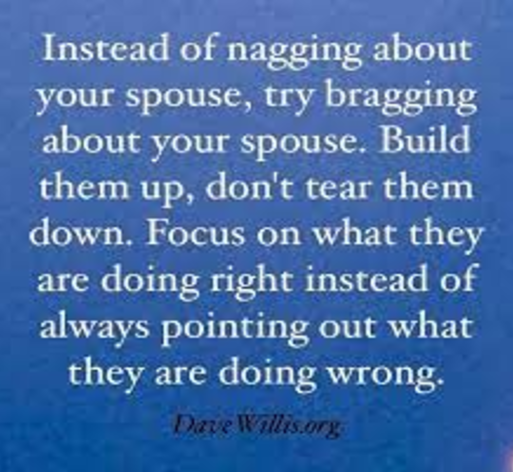“Meet The Marriage Killer” (WSJ 2012)


Our little puppy, Levi, needed to do his morning “constitution.” Rather than first clearing a spot for Levi, which I asked him to do before heading out the door, my husband headed down our long driveway and proceeded blowing down our private road. Meanwhile Levi is starting to cross his legs.

Why was my first instinct to complain (nag) to my husband for not making a “constitution” spot, rather than appreciate him for making our driveway and road safe? Why the desire/need to nag instead of appreciating?

I recently came across an article in the Wall Street Journal, by Elizabeth Bernstein, about relationships. Her article, “Meet the Marriage Killer,” talked about what really happens in the day-to-day life of a typical married couple and the frustrations that lead to what we commonly call "nagging. Here is a brief video of that article.
Wikipedia defines “nagging” as a repetitious behavior in the form of pestering, hectoring, harassing, or otherwise continuously urging an individual to complete previously discussed requests or act on advice. The word is derived from the Scandinavian nagga, which means to “gnaw.”

Nagging is a common marital complaint in my office. It can be found between both male and female spouses. According to The Wall Street Journal, "It is possible for husbands to nag, and wives to resent them for nagging. But women are more likely to nag, experts say, largely because they are conditioned to feel more responsible for managing home and family life. And they tend to be more sensitive to early signs of problems in a relationship.

Nagging is a form of toxic communication in which one spouse repeatedly makes a request which is repeatedly ignored by the other. Both parties in a nagging situation become frustrated and are more likely to entrench their positions. There are many reasons that marriages lead to divorce. Most people know about the dangers of infidelity, financial issues, differences in parenting styles… to name a few… but nagging is one marriage killer that is much more subtle and dangerous.

Most people would agree that nagging is an ineffective way of communicating, but why do so many of us do it? A woman wants to feel like a woman in her relationship and when she nags, it’s her way of trying to let her man know that something is missing and she’s not feeling the way she wants to. If she feels insecure in the relationship she will automatically nag, question everything, when really all she wants is validation you love her and want to spend time with her. You know that ole saying, “negative attention is better than none.” And yes, adults do it as much as children.

My client Lisa is a “nagger.” But her nagging is rarely about what she really wants. Her husband travels a lot in his work and she both misses him and resents him for his time away. Plus, she feels more responsible for managing the home and family while he’s away. She believes he should know that, or at least feel the same way. Because she perceives he doesn’t, Lisa starts nagging, about everything.
It would be one thing if nagging worked, but not only does it not work, it usually breeds hostility and disconnection. And when spouses feel hostile and disconnected, they are even less likely to cooperate and be loving partners.
Expectations also play a role in our nagging. It doesn’t take long in marriage to feel that our spouses are not living up to our expectations, and we start to point it out pretty freely. “Use this color towel,” “you wearing that?” “hang your sweater up,”… on and on. We begin to treat our spouse like a child who hasn’t figured life out yet… to our expectations. Rather than being equal, loving partners, we now have the makings of a parent-child relationship. And no one wins. Expectations are disappointments waiting to happen.

Here’s what nagging starts to look like to the naggee:

1. It creates resentment. Nagging may produce an angry response in your spouse or kids and make them resent you. The task you are nagging about becomes the last thing they want to do.
2. Nagging is unpleasant, so you will get tuned out. No one wants to hear the same old nag over and over, and your spouse and kids will simply stop listening. The more you nag, the less they hear.
3. It’s negative reinforcement. Nagging says, in effect, “I will stop punishing you with this annoying nagging when you do what I want you to.” And the person being nagged feels that as soon as he does one task to make you stop nagging, you will just nag about another one.
4. Nagging can make you feel controlled, and no one likes to feel that way. Being nagged feels like you’re being manipulated and tends to make the “naggee” feel like digging in his or her heels instead of doing what he or she is being nagged to do.
5. Nagging focuses on what a person is not doing. Once again, it has a negative focus. Nagging points out all the things that are wrong with the person and implies that he or she is not worthy because he or she has not done certain tasks. Nagging is a way of finding fault, and it tends to wear people down instead of building them up.
Good news, like most anything if you’re willing, you can learn to stop nagging.

Bernstein offers the following tips:
Calm down! Recognize the pattern you are in and talk about how to address it as a team. You will both need to change your behavior, and ground rules can help.
Look at it from the other person’s perspective. “Honey, when you ignore me I feel that you don’t love me.” “I feel that you don’t appreciate what I am already doing when you nag me.”
If you are the nagger, realize you are asking for something. Use an “I” not a “You” statement. “I would really like you to pay the Visa bill on time,” instead of “You never pay the bill on time.”
Explain why your request is important to you. “I worry about our finances when you pay the bill late. We can’t afford to pay late fees.”
Manage your expectations. Make sure you are asking for something that is realistic and appropriate. Does the light bulb need to be changed immediately? Can you do it yourself?
Set a timeframe. Ask when your partner can expect to finish the task. “Can you change the car oil this weekend?” Let him tell you when it works best for him to do it.
If you are the naggee, give a clear response to your partner’s request. Tell her honestly if you can do what she asks and when. Then follow through. Do what you say you will do.
Consider alternative solutions. Maybe it’s worth it to hire a handyman, rather than harm your relationship with arguing.



